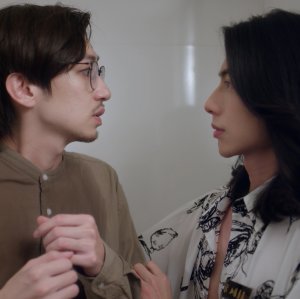Cute and quirky.
Cute, cringe-worthy, hot in a vague way, over-the-top in other ways, but ultimately endearing and human. As in many Anime/BL works, high school is a useful construction for exploring human communication around feelings. But this series seems more sophisticated than most. Love the way competing inner monologues show the vast gaps in perception. Low self-esteem, excessive concern for others perceptions, fear of rejection, impact of childhood on ability to accept love. Some reviewers complain that nothing happens, but what is happening is entirely inside the characters heads. Characters develop a depth of love, learn what they need to do in order to build and maintain their relationship. Develop a larger definition of love that stretches beyond their own needs and even their own relationship. Love that Katori is the voice of the author/adult in the room, gently advising the characters, providing hints to the audience , and making vague snarky comments about the genre. Realistic ? No. But that's not the point.
Usually, conflicts in BL seem improbable, that real adults would never have those sorts of misunderstandings over such trivial matters. But in this case, around episode 6, I came to the embarrassing realization that I still think the way Amagi does, even at 3x his age. I wonder whether its just me (probably), and that for others, the typical BL misunderstandings are real to them.
One way to interpret Amagi's skipping around with arms waving and his continuous talking is as hyperactivity, and his constant running away (giving up) as rejection sensitive dysphoria (RSD).
Maybe because I related so much to Amagi, I have a certain awe for a series that can speak to me across generations as well as cultures. Thank you Yoshino-san, Oriyama, Sato, Suzuki, Komiya and rest of the cast and crew.
Also, loved the slow beat dance club music brought out whenever there is sexual tension between Takara and Amagi. It was subtle but delightfully camp.
Usually, conflicts in BL seem improbable, that real adults would never have those sorts of misunderstandings over such trivial matters. But in this case, around episode 6, I came to the embarrassing realization that I still think the way Amagi does, even at 3x his age. I wonder whether its just me (probably), and that for others, the typical BL misunderstandings are real to them.
One way to interpret Amagi's skipping around with arms waving and his continuous talking is as hyperactivity, and his constant running away (giving up) as rejection sensitive dysphoria (RSD).
Maybe because I related so much to Amagi, I have a certain awe for a series that can speak to me across generations as well as cultures. Thank you Yoshino-san, Oriyama, Sato, Suzuki, Komiya and rest of the cast and crew.
Also, loved the slow beat dance club music brought out whenever there is sexual tension between Takara and Amagi. It was subtle but delightfully camp.
Was this review helpful to you?








